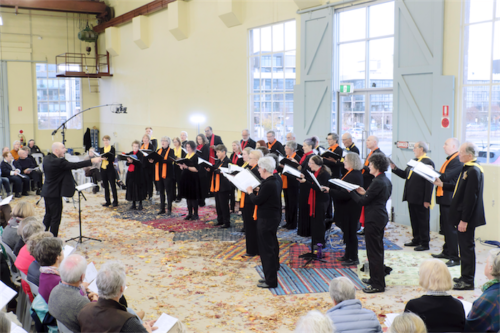Highly textured harmonies that defy description
 Friday, June 11, 2021 at 3:23PM
Friday, June 11, 2021 at 3:23PM From the review by Rob Kennedy, CityNews
 Photo: Peter Hislop
Photo: Peter Hislop
“The Song Company featuring The Oriana Chorale directed by Dan Walker, performed new and older works in the Albert Hall last night. They were “Transiens”, by Antony Pitts, a new 25-part choral motet, three shorts works and for the 50th anniversary of “Jesus’ Blood Never Failed Me Yet”, by Gavin Bryars, a choral version that was a world premiere.”
On Bryars: “[…] Moving around the hall, small groups of singers came in and out, creating a striking spatial effect. This aspect of the singing was not just well thought-out, it added so much to the performance aspect of the concert. As this work builds and builds, it cuts deeper into the listener. With Pitts conducting, he gave movement directions for the groups and drew an expressive warmth from every singer.
The highly textured harmonies in this piece were astounding as the groups and soloists moved around. As the old man on loop came in and out during the work. It was hard to tell if this was intentional or an issue with the audio, but it was a truly astounding experience.”
On “Transiens”: “[…] The glorious sound of this large choir came into their own during this work. While a contemporary piece, it held an ancient sound. Again, the singers crossed the floor for different parts. So full, rich and complex was this piece that it probably should be considered a major new Australian choral work.”
On the concert: “Well done to Antony Pitts and to every singer. Despite a slight hitch, this was a concert of the highest quality. The standing ovation proving that it was.”





